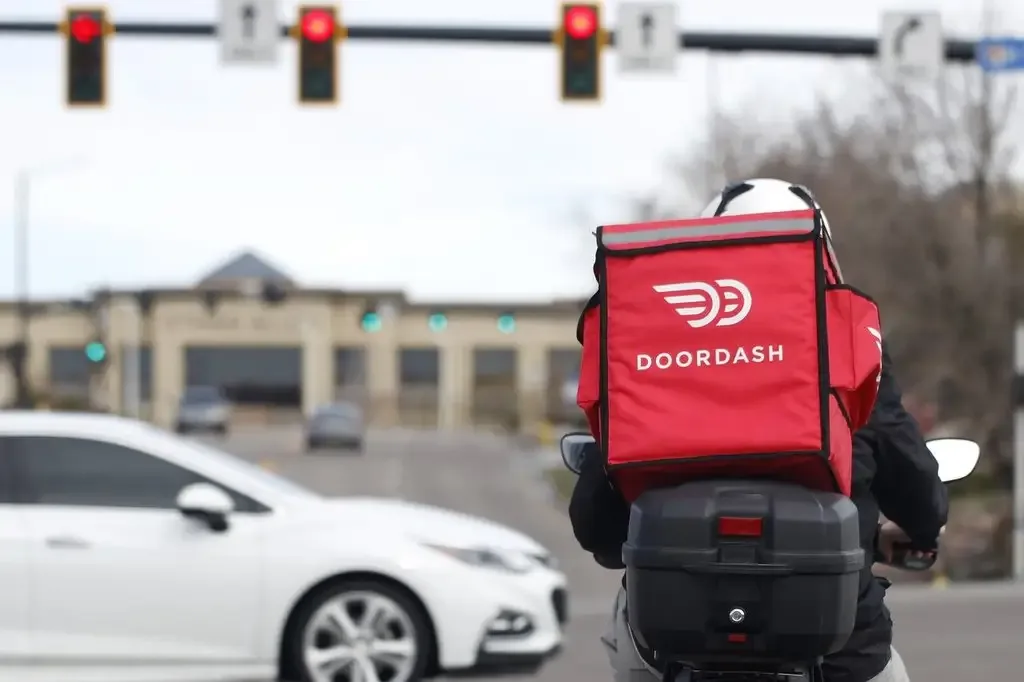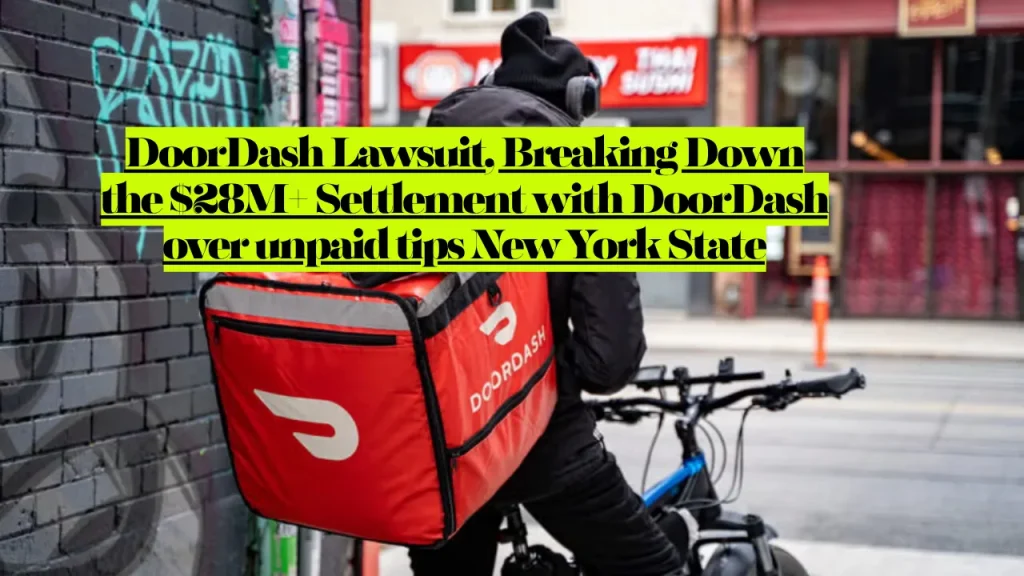DoorDash Lawsuit, Breaking Down the $28M+ Settlement with DoorDash over unpaid tips New York State
DoorDash faces multiple active lawsuits totaling over $28 million in settlements for tip misappropriation, worker misclassification, and consumer fraud—with New York securing $16.75 million and Illinois obtaining $11.25 million in separate enforcement actions. A March 2025 defamation lawsuit seeks $10 million after DoorDash allegedly branded a CEO as a fraudster, while Canada’s competition authority launched a major pricing deception lawsuit in June 2025.
What Is the DoorDash Lawsuit?
Between May 2017 and September 2019, DoorDash used customer tips to offset the base pay it guaranteed workers instead of giving workers their full tips. State attorneys general discovered DoorDash’s pay guarantee model allowed the company to pocket tips meant for delivery drivers.
If customers tipped $3, DoorDash paid drivers only $7, keeping the dasher’s total at $10—regardless of tip amount. The company maintained this practice across multiple states while telling customers “Dashers will always receive 100 percent of the tip.”
Active DoorDash Litigation Status
Multiple jurisdictions are pursuing DoorDash for labor law violations, consumer protection breaches, and privacy failures. New York’s settlement claims process opened in April 2025 with a November 21, 2025 deadline, expecting to distribute payments through 2025.
Illinois payments were distributed in March 2025 to eligible dashers who submitted claims by February 10, 2025, compensating over 79,000 workers for tips allegedly used to meet guaranteed pay amounts.
Major Legal Claims Against DoorDash
Tip Theft and Worker Compensation
Customers were misled into believing their tips would directly benefit dashers, but DoorDash would keep the tips and take them out of their guaranteed pay. The company guaranteed pay to delivery workers, then only paid whatever the tip didn’t cover.
The Illinois Attorney General alleged that DoorDash’s practice encouraged customers to tip as much as possible while allowing DoorDash to pay less of its own money. Workers could only see tips if they exceeded the guaranteed amount.
Related article: Abigail Zwerner’s $40M Lawsuit EXPOSED – School Ignored 3 Warnings Before Teacher Shot by 6-Year-Old

Independent Contractor Misclassification
Many DoorDash driver lawsuits sought up to $25,000 per driver for alleged misclassification as independent contractors, claiming DoorDash should reimburse drivers for gas, mileage, and pay minimum wages plus overtime.
A federal settlement of $663,520 was approved in May 2024 for dashers misclassified as independent contractors between August 2016 and August 2023. The case alleged violations of the Fair Labor Standards Act by failing to pay minimum wages.
A separate $100 million settlement benefits drivers in California and Massachusetts who claimed improper contractor classification from August 2016 through March 2021. Class members receive payments proportional to miles driven while completing deliveries.
Privacy Violations and Data Breaches
California Attorney General secured a $375,000 settlement in February 2024 after DoorDash participated in marketing cooperatives that shared customer personal information without notice or opt-out options. The company violated the California Consumer Privacy Act and California Online Privacy Protection Act.
A 2019 data breach exposed personal information of 4.9 million DoorDash customers and drivers, including names, email addresses, delivery addresses, phone numbers, and partial payment card information. DoorDash waited five months before informing affected individuals.
Recent Court Rulings and Settlements
New York Attorney General Settlement – $16.75 Million
New York Attorney General Letitia James secured $16.75 million in restitution from DoorDash in February 2025, with up to $1 million in settlement administrator costs. Approximately 63,000 New York delivery workers stand to benefit from this settlement.
During the disputed period, New Yorkers placed more than 11 million delivery orders with DoorDash. Payments began in early 2025, with eligible drivers contacted via mail, email, and text.
Settlement Requirements:
- DoorDash must maintain a pay model ensuring consumer tips go entirely to dashers
- Tips cannot impact the base amount DoorDash pays workers
- Clear, easy-to-access information for consumers and workers about payment practices
- Disclosure of any future changes to tipping or payment models
Illinois Attorney General Settlement – $11.25 Million
Illinois Attorney General Kwame Raoul announced an $11.25 million settlement in November 2024 to resolve allegations DoorDash violated the Illinois Consumer Fraud and Deceptive Business Practices Act. The settlement covers dashers who completed deliveries between July 2017 and September 2019 under the Pay Guarantee Model.
Payment to each eligible dasher represents their proportional share of the settlement fund based on consumer tips allegedly used to satisfy guaranteed amounts. Over 79,000 workers received payments in March 2025.
District of Columbia Settlement – $2.5 Million
Washington D.C. Attorney General Karl Racine secured a $2.5 million settlement requiring DoorDash to pay $1.5 million to affected workers, $750,000 to the District, and donate $250,000 to local charities. The November 2019 lawsuit alleged DoorDash misled consumers about how tips contributed to worker pay.
Customer Defamation Lawsuit – $10 Million Sought
Phyllis Jager, CEO of zuMedia, filed a $10 million lawsuit in March 2025 alleging DoorDash falsely flagged her as a fraudster after she raised concerns about delivery photo policies. The 83-page complaint includes allegations of defamation, fraud, breach of contract, and false advertising.
Jager’s company claims to have placed $3.4 million in DoorDash orders since 2021. DoorDash allegedly demanded unencrypted images of her credit cards and reported her to banks and other delivery services as a fraudster.
Canada Competition Bureau Lawsuit – Pricing Deception
Canada’s Competition Bureau filed a lawsuit in June 2025 alleging DoorDash advertised misleading prices and discounts, engaged in “drip pricing,” and misrepresented fees as taxes. The bureau requested DoorDash stop deceptive practices, pay monetary penalties, and provide restitution to affected customers.
Related article: DoorDash Driver Livie Henderson Lawsuit, Viral Sexual Assault Claim Sparks Privacy Battle—Who’s Getting Sued?

What Are the Implications for DoorDash Drivers?
Compensation and Back Pay
Eligible dashers received settlements ranging from nominal amounts to hundreds of dollars depending on deliveries completed during violation periods. Illinois payments averaged $2 or more per eligible dasher, calculated proportionally based on claimed tips.
The California and Massachusetts settlement estimates average payments around $130, depending on claim rates, with minimum payments of $10.
Changes to Payment Models
DoorDash stopped using the disputed pay guarantee model in September 2019. Current payment structures must ensure tips go entirely to workers without affecting base compensation.
Settlement agreements require DoorDash to provide clear disclosures to workers about payment calculations and any future changes to compensation models.
Employment Classification Questions
In 2018, the California Supreme Court adopted a test presuming all California workers are employees unless employers prove workers are free from company control. This ABC test made misclassification claims more viable.
The degree of control DoorDash exercises over drivers and the fact they perform services central to DoorDash’s business indicate drivers should be classified as employees, according to misclassification lawsuits.
What Does This Mean for Customers?
Tip Transparency and Trust
At checkout, customers were encouraged to tip with messages stating “Dashers will always receive 100 percent of the tip,” but disclosures about tip usage were buried in online documents. Customers had no way of knowing DoorDash used tips to reduce its own costs.
Pricing Clarity Concerns
A proposed class action alleges DoorDash charges misleading delivery fees, express fees, and expanded range fees that consumers don’t understand. The lawsuit claims DoorDash manipulates fees “at its whim” to induce low-cost orders while raising fees elsewhere.
Dashers are never informed when consumers pay extra for “priority” delivery, making these express orders take as long as standard deliveries.
Privacy and Data Security
DoorDash must now comply with California privacy laws, provide clear opt-out mechanisms, and disclose when it sells or shares consumer personal information. The company halted participation in marketing cooperatives sharing customer data.
The 2019 data breach class action alleged DoorDash misled customers by promoting data security as a primary selling point while failing to protect user information adequately.
Legal Precedent and Gig Economy Impact
Worker Classification Standards
DoorDash settled a 2017 class action lawsuit for $3.5 million plus an additional $1.5 million if the company went public or doubled its valuation. Since then, DoorDash’s market valuation has increased substantially.
Companies like DoorDash were never supposed to run entire businesses on the backs of independent contractors, as people working in the company’s core line of business are its employees, according to ongoing litigation.
Consumer Protection Enforcement
The Illinois settlement highlights that subsequent remedial measures don’t always insulate companies from prior practices that violate consumer protection laws. The Attorney General sought remedies for practices discontinued five years before the settlement.
California Attorney General Rob Bonta emphasized that sharing customer information with marketing cooperatives constitutes a “sale” under CCPA and that businesses must disclose such sales and offer opt-outs.
Frequently Asked Questions
How much can I get from the DoorDash settlement?
Settlement amounts vary by jurisdiction and individual circumstances. New York’s $16.75 million fund will be distributed among approximately 63,000 eligible dashers. Illinois paid eligible dashers $2 or more based on proportional share of tips allegedly used by DoorDash. The Office of the Attorney General calculates each dasher’s share as a percentage of the total settlement fund.
Am I eligible for DoorDash lawsuit compensation?
Eligibility generally requires delivering for DoorDash during specific periods—New York’s settlement covers May 2017 through September 2019. Illinois covers July 2017 through September 2019 for dashers paid under the Pay Guarantee Model who received tips allegedly used to satisfy guaranteed amounts.
Did DoorDash admit wrongdoing?
DoorDash denies allegations but agreed to settle to resolve the matters. The company maintains that all tips were paid to dashers and the Pay Guarantee Model fairly compensated workers.
Is the DoorDash misclassification lawsuit still active?
A $100 million settlement for California and Massachusetts drivers received approval, with claims processed in 2024. A separate $663,520 federal settlement for misclassification claims received final approval in May 2024. Additional misclassification claims continue in various jurisdictions.
What changes has DoorDash made after these lawsuits?
DoorDash stopped using the disputed Pay Guarantee Model in September 2019. Settlement agreements require DoorDash to maintain pay models ensuring consumer tips are paid to dashers entirely without impacting base payments. The company must provide transparent disclosures about payment practices.
Can DoorDash be sued for data breaches?
A class action lawsuit was filed after the 2019 data breach affecting 4.9 million users alleged DoorDash breached its duty to safeguard user information. The lawsuit claims the company’s slow response allowed customer information to circulate on the dark web.
What should I do if I received a settlement notice?
New York dashers who receive notices should file claims by November 21, 2025, using the unique claim ID number provided. Claims can be submitted online or by mail to the settlement administrator, Atticus Administration.
Disclaimer: This information is for educational purposes only and does not constitute legal advice. Consult an attorney specializing in employment law, gig economy law, or your specific jurisdiction for legal guidance on your situation. Settlement claim deadlines, eligibility requirements, and compensation amounts vary by case and jurisdiction.
Related Articles
Learn more about employment law and gig economy rights:
- How Much Does an Employment Lawyer Cost
- Frontier and United Airlines Embroiled in Federal Wage Theft Lawsuits in Colorado
- How to File a Wage and Hour Complaint
About the Author

Sarah Klein, JD, is a licensed attorney and legal content strategist with over 12 years of experience across civil, criminal, family, and regulatory law. At All About Lawyer, she covers a wide range of legal topics — from high-profile lawsuits and courtroom stories to state traffic laws and everyday legal questions — all with a focus on accuracy, clarity, and public understanding.
Her writing blends real legal insight with plain-English explanations, helping readers stay informed and legally aware.
Read more about Sarah
